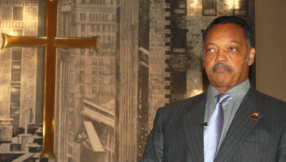
New statistics indicate that fewer Brits than ever believe Christianity to be an essential part of our cultural and national identity.
The recently published annual Social Attitudes Survey, which also found that levels of racial prejudice are "on the rise" across the UK, reveals that just 24 per cent of 3,000 individuals polled said that having a Christian faith is an important element of being British, down from 31 per cent who said the same in 2003.
Politicians and faith leaders alike waded into this debate in April following Prime Minister David Cameron's declaration that the UK is a "Christian country".
Some agreed with the PM's assertions - "It is clear that, in the general sense of being founded in Christian faith, this is a Christian country," remarked Archbishop of Canterbury Justin Welby.
"It is a historical fact (perhaps unwelcome to some, but true) that our main systems of ethics, the way we do law and justice, the values of society, how we decide what is fair, the protection of the poor, and most of the way we look at society...All have been shaped by and founded on Christianity."
Farooq Murad, of the Muslim Council of Great Britain, said: "No one can deny that Britain remains largely a Christian country...we respect that."
However many others rejected Cameron's statement, and an open letter – signed by 50 leading academics and scientists including author Philip Pullman and broadcaster Dan Snow - contended that his words served to "foster alienation and division in our society".
"At a social level, Britain has been shaped for the better by many pre-Christian, non-Christian, and post-Christian forces," read the letter, published first in The Telegraph.
"We are a plural society with citizens with a range of perspectives, and we are a largely non-religious society."
The 2013 census revealed that 59 per cent of UK citizens identify themselves as 'Christian', which signified a decrease of 13 per cent in a decade. It is perhaps unsurprising, therefore, that the number of those who consider the Christian faith to be an integral part of what it means to be British is also falling.
The Social Attitudes Survey also found that 95 per cent of Brits think speaking English is central to a British identity, a rise from 86 per cent in 2003, while 74 per cent identified being born in the UK as of importance and 51 per cent indicated that British ancestry is a key part of being "truly British".
Over three quarters of those asked (77 per cent) agreed that a person must have lived in Britain for the majority of their life to be considered British – another statistic that has risen since 2003, when 69 per cent held this view.
Penny Young of NatCen Social Research, which compiled the study, has commented that the results indicate that British attitudes towards a national identity have become more conservative in recent years.
"In an increasingly diverse, multicultural country, we might expect people to be more relaxed about what it means to be British," she said, according to the BBC. "Yet the trend is going in the opposite direction.
"It is now harder to be considered British than in the past and one message comes through loud and clear; if you want to be British, you must speak English."













